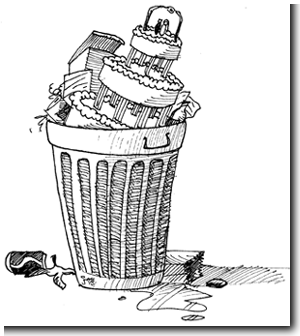![]()
![[ OPINIONS ]](/images/fall97/opinionsf97.gif)
By M. Stephanie Murray
Arizona Daily Wildcat February 25, 1998
The last rites of marriage
![[Picture]](04_3_i.gif)
M. Stephanie Murray |
In the future, there will be no marriage. As we move toward the millennium,
my prophetic skills are growing stronger. And while you may not believe
that soon we will all be wearing neon-patterned, nylon warm-up suits and
driving mini-vans that look increasingly like eggs, believe me when I say
your kids will never get married.
Let's look at this rationally. Half of all marriages today end in divorce. You can see this as a dire warning that the moral fiber of our cultural tapestry is rotting, or you can see this as a sign that an altogether different collection of cultural mores is evolving.
Those who take the former view are behind the movement toward "covenant marriages," which are impossible to get out of without blaming someone. Yeah, that's healthy. The argument is that children of divorce are more screwed up than children of two-parent nuclear families. No one says much about what the children of covenant divorce will be, having witnessed the brutal blame-assignment for abuse, neglect or adultery necessary to dissolve a covenant marriage.
Taking the latter proposition as a starting point, though, the "covenant marriage" thrust is just one more symptom of the pre-millennial fever striking the more conservative members of our culture. And, like all fever-induced hallucinations, it will disappear once the psychosomatic effects of the century-ending anxiety pass.
And then there will be no marriage. Follow me, here.
If at least half of all marriages eventually become divorces, it follows that a proportionate number of today's children are affected by divorce. Among twentysomethings, most people whose parents have divorced are admittedly and understandably wary of marriage unless they really mean it. More and more of this generation is choosing to put off marriage until at least their late twenties, if not much later. This trend can only continue with the next generation; to children of divorce, marriage becomes simultaneously more revered and less relevant.
Once upon a time, the threat of illegitimacy for one's children was the ultimate leverage, even against the most adamantly anti-marriage individual. But as the stigma waned, so did the leverage. Today an unprecedented number of children are being born out of wedlock. In fact, bastard children are fast becoming the norm among male sports and music stars, and the public at large is not far behind.

So if marriage is irrelevant, usually ends in divorce (sometimes really nasty covenant divorce) and is not the only forum in which to have children, what's the point?
Marriage is, at its heart, a social construction meant to provide a stable base for raising children and consolidating property. If these objectives can be achieved without marriage, the concept loses its value. Religion remains one way of placing social value on marriage, but mainstream religion is fighting its own relevance battles these days. Without secular support, marriage is bound to flounder.
(There are other, more prosaic arguments for the demise of marriage. Our editor in chief, Tom, says that the bowtie is responsible. He explains that men cannot tie bow ties; women can. While the bowtie, and other elaborate neck adornments, were fashionable, men needed women present in their homes while they were getting dressed. Hence, marriage. Now that bow ties have fallen by the fashion wayside, marriage is no longer necessary.)
And that is why your kids won't get married.
As for myself, I plan to give in to the pressures of this particular social construct. I'll get married, mostly because I want to. But I'm an anomaly; I'm a bastard child who never had to deal with the horrors of divorce. Marriage is nothing more to me than a cool idea that nets you good presents. Plus, it'll make my mom happy.
But as far as my still-hypothetical children go, they won't need to get married just to please their mom. So perhaps it's best that marriage ends here; I'm certainly not going to a wedding in which the bride wears a cream Fila warm-up suit and the happy couple are chauffeured away in a Chevy Lumina.
M. Stephanie Murray is a senior majoring in English literature. Her column, "What Fresh Hell?," appears sporadically.



